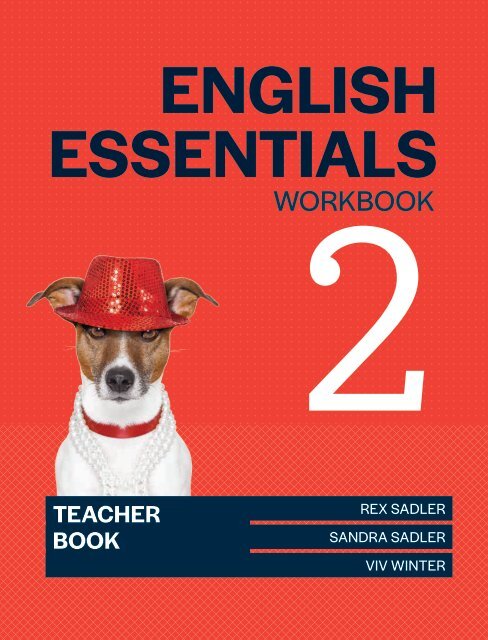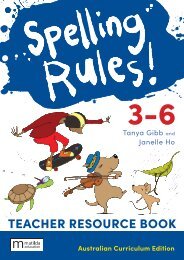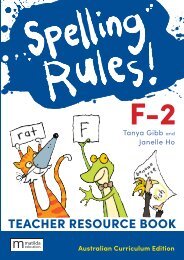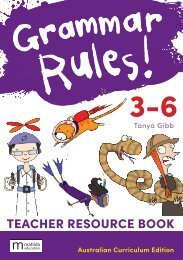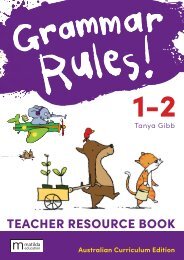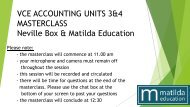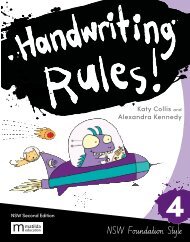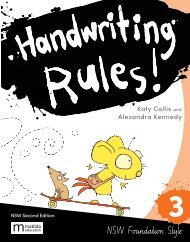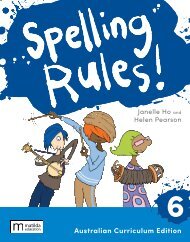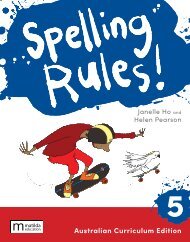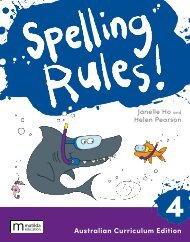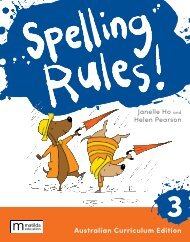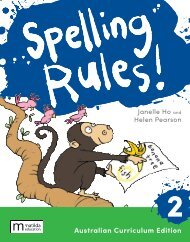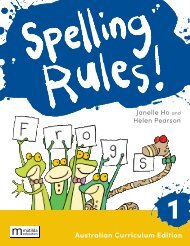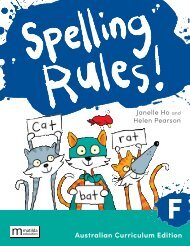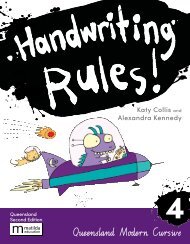English Essentials Teacher Book 2 sample
English Essentials Workbook 2 accommodates a wide range of student abilities and is suitable for both classwork and homework. The units in each section are short and self-contained, making them highly accessible and offering teachers maximum flexibility. The grammar and language units provide clear explanations of rules and conventions with carefully sequenced exercises. The texts selected for comprehension are rich and varied, while the writing tasks provide guidelines, models and photographs to help inspire students to develop their writing skills. This Teacher Book provides answers to all the comprehension, language, spelling and vocabulary questions in the student workbook.
English Essentials Workbook 2 accommodates a wide range of student abilities and is suitable for both classwork and homework. The units in each section are short and self-contained, making them highly accessible and offering teachers maximum flexibility. The grammar and language units provide clear explanations of rules and conventions with carefully sequenced exercises. The texts selected for comprehension are rich and varied, while the writing tasks provide guidelines, models and photographs to help inspire students to develop their writing skills.
This Teacher Book provides answers to all the comprehension, language, spelling and vocabulary questions in the student workbook.
Create successful ePaper yourself
Turn your PDF publications into a flip-book with our unique Google optimized e-Paper software.
ENGLISH<br />
ESSENTIALS<br />
WORKBOOK<br />
TEACHER<br />
BOOK<br />
REX SADLER<br />
SANDRA SADLER<br />
VIV WINTER
ENGLISH<br />
ESSENTIALS<br />
WORKBOOK<br />
TEACHER<br />
BOOK<br />
REX SADLER<br />
SANDRA SADLER<br />
VIV WINTER
<strong>English</strong> <strong>Essentials</strong> Workbook 1 <strong>Teacher</strong> <strong>Book</strong><br />
1st edition<br />
Rex Sadler<br />
Sandra Sadler<br />
Viv Winter<br />
This edition published in 2021 by<br />
Matilda Education Australia, an imprint<br />
of Meanwhile Education Pty Ltd<br />
Level 1/274 Brunswick St<br />
Fitzroy, Victoria Australia 3065<br />
T: 1300 277 235<br />
E: customersupport@matildaed.com.au<br />
www.matildaeducation.com.au<br />
Publisher: Olive McRae<br />
Project editor: Alanna Burgess<br />
Copy editor: Ronél Redman<br />
Proofreader: Sarah Blood<br />
Design manager: Jo Groud<br />
Cover designer: Ana Cosma<br />
Text designer: Ana Cosma<br />
Production controller: Nicole Ackland<br />
Permissions researcher: Samantha Russell-Tulip<br />
Typeset in PMN Caecilia 55 Roman 10pt on 16pt<br />
by Newgen KnowledgeWorks Pvt. Ltd., Chennai, India<br />
Cover image: Shutterstock.com/Javier Brosch<br />
First edition published in 2019 by Macmillan Science and<br />
Education Australia Pty Ltd<br />
Copyright © Rex Sadler, Sandra Sadler and Viv Winter 2019<br />
The moral rights of the authors have been asserted.<br />
All rights reserved.<br />
Except under the conditions described in the Copyright Act<br />
1968 of Australia (the Act) and subsequent amendments,<br />
no part of this publication may be reproduced, stored in<br />
a retrieval system, or transmitted in any form or by any<br />
means, electronic, mechanical, photocopying, recording<br />
or otherwise, without the prior written permission of the<br />
copyright owner.<br />
Educational institutions copying any part of this book for<br />
educational purposes under the Act must be covered by<br />
a Copyright Agency Limited (CAL) licence for educational<br />
institutions and must have given a remuneration notice<br />
to CAL.<br />
Licence restrictions must be adhered to. For details of the<br />
CAL licence contact:<br />
Copyright Agency Limited, Level 11, 66 Goulburn Street,<br />
Sydney, NSW 2000.<br />
Telephone: (02) 9394 7600.<br />
Email: memberservices@copyright.com.au<br />
Publication data<br />
Author: Rex Sadler, Sandra Sadler, Viv Winter<br />
Title: <strong>English</strong> <strong>Essentials</strong> Workbook 1 <strong>Teacher</strong> <strong>Book</strong><br />
ISBN: 9781420246216<br />
A catalogue record for this<br />
book is available from the<br />
National Library of Australia<br />
Internet addresses<br />
At the time of printing, the internet addresses appearing<br />
in this book were correct. Owing to the dynamic nature of<br />
the internet, however, we cannot guarantee that all these<br />
addresses will remain correct.<br />
Warning: It is recommended that Aboriginal and Torres<br />
Strait Islander peoples exercise caution when viewing this<br />
publication as it may contain names or images of deceased<br />
persons.<br />
Printed in by <br />
1 2 3 4 5 6 7 25 24 23 22 21 20
CONTENTS<br />
Preface ...................................................................................................................................................................................................................................................................................................................................................................... vii<br />
Acknowledgements ................................................................................................................................................................................................................................................................................................................... viii<br />
PART 1 Language 1<br />
UNIT 1 Phrases ............................................................................................................................................................................................................................................. 2<br />
UNIT 2 Clauses ............................................................................................................................................................................................................................................. 4<br />
UNIT 3 Types of nouns ................................................................................................................................................................................................................. 6<br />
UNIT 4 Nouns – singular and plural ................................................................................................................................................................ 8<br />
UNIT 5 Irregular plural nouns .................................................................................................................................................................................... 10<br />
UNIT 6 Sound nouns ................................................................................................................................................................................................................... 12<br />
UNIT 7 Adjectives ............................................................................................................................................................................................................................... 14<br />
UNIT 8 Comparison of adjectives .................................................................................................................................................................. 16<br />
UNIT 9 Verbs .................................................................................................................................................................................................................................................. 18<br />
UNIT 10 Present participles .............................................................................................................................................................................................. 20<br />
UNIT 11 Past participles .......................................................................................................................................................................................................... 22<br />
UNIT 12 Adverbs ....................................................................................................................................................................................................................................... 24<br />
UNIT 13 Pronouns .................................................................................................................................................................................................................................. 26<br />
UNIT 14 Prepositions ...................................................................................................................................................................................................................... 27<br />
UNIT 15 Prefixes ........................................................................................................................................................................................................................................ 28<br />
UNIT 16 Suffixes ........................................................................................................................................................................................................................................ 30<br />
UNIT 17 Using better words ............................................................................................................................................................................................ 32<br />
UNIT 18 Word origins in <strong>English</strong> ............................................................................................................................................................................. 34<br />
UNIT 19 Punctuation overview .................................................................................................................................................................................. 36<br />
UNIT 20 Capital letters and full stops ........................................................................................................................................................ 37<br />
UNIT 21 End-of-sentence punctuation ................................................................................................................................................... 38<br />
UNIT 22 Commas to indicate pauses ........................................................................................................................................................ 39<br />
UNIT 23 Commas for lists .................................................................................................................................................................................................... 40<br />
UNIT 24 Apostrophes showing ownership ..................................................................................................................................... 41<br />
UNIT 25 Apostrophes for contractions ................................................................................................................................................... 42<br />
UNIT 26 Confusing apostrophes ........................................................................................................................................................................... 43<br />
UNIT 27 Direct speech ................................................................................................................................................................................................................. 44<br />
UNIT 28 More direct speech ........................................................................................................................................................................................... 45<br />
iii
UNIT 29 Direct and indirect speech ............................................................................................................................................................... 46<br />
UNIT 30 The colon ................................................................................................................................................................................................................................. 47<br />
UNIT 31 The semicolon .............................................................................................................................................................................................................. 48<br />
UNIT 32 Brackets ..................................................................................................................................................................................................................................... 49<br />
UNIT 33 Dashes .......................................................................................................................................................................................................................................... 50<br />
UNIT 34 Language and punctuation revision ........................................................................................................................... 51<br />
PART 2 Spelling & Vocabulary 53<br />
UNIT 1 Tricky little words ................................................................................................................................................................................................... 54<br />
UNIT 2 Texts in action ............................................................................................................................................................................................................... 55<br />
UNIT 3 It’s all in the family ............................................................................................................................................................................................... 56<br />
UNIT 4 In the wild ............................................................................................................................................................................................................................... 57<br />
UNIT 5 Actions .......................................................................................................................................................................................................................................... 58<br />
UNIT 6 Sound pairs ........................................................................................................................................................................................................................ 59<br />
UNIT 7 All kinds of people .............................................................................................................................................................................................. 60<br />
UNIT 8 Our world ................................................................................................................................................................................................................................. 61<br />
UNIT 9 The five senses .......................................................................................................................................................................................................... 62<br />
UNIT 10 Firestorm .................................................................................................................................................................................................................................. 63<br />
UNIT 11 When worlds collide ....................................................................................................................................................................................... 64<br />
UNIT 12 Feelings and emotions .............................................................................................................................................................................. 65<br />
UNIT 13 Words and sounds ............................................................................................................................................................................................. 66<br />
UNIT 14 Amazing inventions .......................................................................................................................................................................................... 67<br />
UNIT 15 The world of sport ............................................................................................................................................................................................... 68<br />
UNIT 16 Oh, horror! ............................................................................................................................................................................................................................. 69<br />
UNIT 17 Journey through time ................................................................................................................................................................................... 70<br />
UNIT 18 The world of art ......................................................................................................................................................................................................... 71<br />
UNIT 19 Getting an education .................................................................................................................................................................................... 72<br />
UNIT 20 It pays to advertise ............................................................................................................................................................................................ 73<br />
UNIT 21 Flooding rains ................................................................................................................................................................................................................ 74<br />
UNIT 22 Is there a doctor in the house? .............................................................................................................................................. 75<br />
UNIT 23 Problem pairs ................................................................................................................................................................................................................. 76<br />
UNIT 24 A time of war ................................................................................................................................................................................................................... 77<br />
UNIT 25 Words from other lands .......................................................................................................................................................................... 78<br />
UNIT 26 Buying and selling ............................................................................................................................................................................................... 79<br />
iv<br />
Contents
UNIT 27 Don’t stop the music ..................................................................................................................................................................................... 80<br />
UNIT 28 In the laboratory ....................................................................................................................................................................................................... 81<br />
UNIT 29 On the farm ......................................................................................................................................................................................................................... 82<br />
UNIT 30 Flight .................................................................................................................................................................................................................................................. 83<br />
UNIT 31 Fun with words ........................................................................................................................................................................................................... 84<br />
PART 3 Literature 85<br />
UNIT 1 First person narrative ................................................................................................................................................................................... 86<br />
UNIT 2 The power of advertising ..................................................................................................................................................................... 88<br />
UNIT 3 Autobiography ............................................................................................................................................................................................................. 90<br />
UNIT 4 Plastic in our oceans ..................................................................................................................................................................................... 92<br />
UNIT 5 The deep ................................................................................................................................................................................................................................... 94<br />
UNIT 6 Into the future ................................................................................................................................................................................................................ 96<br />
UNIT 7 The forces of nature ........................................................................................................................................................................................ 98<br />
UNIT 8 Hoon driving ................................................................................................................................................................................................................ 100<br />
UNIT 9 Cartoonists raising awareness ........................................................................................................................................... 102<br />
UNIT 10 Boat people .................................................................................................................................................................................................................. 104<br />
UNIT 11 The Stolen Generations ..................................................................................................................................................................... 106<br />
UNIT 12 Amazing inventions ..................................................................................................................................................................................... 108<br />
UNIT 13 Metaphors in poetry .................................................................................................................................................................................. 110<br />
UNIT 14 Supernatural worlds .................................................................................................................................................................................. 112<br />
UNIT 15 Film poster ...................................................................................................................................................................................................................... 114<br />
UNIT 16 Surf’s up ................................................................................................................................................................................................................................ 116<br />
UNIT 17 Diary novels .................................................................................................................................................................................................................. 118<br />
UNIT 18 Out of the past ....................................................................................................................................................................................................... 120<br />
UNIT 19 Interview with an author ................................................................................................................................................................... 122<br />
UNIT 20 A hard life ........................................................................................................................................................................................................................... 124<br />
UNIT 21 Poems from real life .................................................................................................................................................................................... 126<br />
UNIT 22 A war of words ....................................................................................................................................................................................................... 128<br />
UNIT 23 The curse of Tutankhamun ......................................................................................................................................................... 130<br />
UNIT 24 Frankenstein’s monster ...................................................................................................................................................................... 132<br />
UNIT 25 Speeches – injustice ................................................................................................................................................................................. 134<br />
UNIT 26 Interesting idioms ............................................................................................................................................................................................ 136<br />
UNIT 27 Lost and alone ........................................................................................................................................................................................................ 138<br />
Contents<br />
v
PART 4 Writing 139<br />
UNIT 1 Life experiences .................................................................................................................................................................................................. 140<br />
UNIT 2 Being persuasive .............................................................................................................................................................................................. 141<br />
UNIT 3 Appealing to the senses ................................................................................................................................................................... 142<br />
UNIT 4 People in conflict .............................................................................................................................................................................................. 143<br />
UNIT 5 Myself in ten years’ time .................................................................................................................................................................. 144<br />
UNIT 6 This sporting life ................................................................................................................................................................................................. 145<br />
UNIT 7 What if …? ....................................................................................................................................................................................................................... 146<br />
UNIT 8 Writing informatively .................................................................................................................................................................................. 147<br />
UNIT 9 Fictional diaries ..................................................................................................................................................................................................... 148<br />
UNIT 10 When disaster strikes ............................................................................................................................................................................. 149<br />
UNIT 11 Dialogue reveals character ......................................................................................................................................................... 150<br />
UNIT 12 The trip of a lifetime .................................................................................................................................................................................... 151<br />
UNIT 13 Sci-fi ............................................................................................................................................................................................................................................... 152<br />
UNIT 14 Adopting a persona .................................................................................................................................................................................... 153<br />
UNIT 15 Creatures great and small ............................................................................................................................................................ 154<br />
UNIT 16 Money makes the world go round ............................................................................................................................ 155<br />
UNIT 17 Fantasy worlds ...................................................................................................................................................................................................... 156<br />
UNIT 18 Eyewitness accounts ............................................................................................................................................................................... 157<br />
UNIT 19 Points of view ........................................................................................................................................................................................................... 158<br />
UNIT 20 At the airport ............................................................................................................................................................................................................... 159<br />
vi<br />
Contents
PREFACE<br />
Our primary purpose in writing this workbook is to develop essential <strong>English</strong> skills. However, we also aim<br />
to motivate students to engage with the way our language works and to build confidence in their own<br />
ability to communicate effectively.<br />
Essential <strong>English</strong> Workbook 2 is divided into four key sections for maximum accessibility and flexibility:<br />
• Part 1: Language<br />
• Part 2: Spelling & vocabulary<br />
• Part 3: Literature<br />
• Part 4: Writing<br />
The Language section is designed to extend students’ understanding and control of language. The basics<br />
of grammar and punctuation are presented in a relevant and meaningful sequence so that students gain<br />
confidence as they improve their language skills.<br />
The Spelling & vocabulary section will enable students to improve their basic literacy skills. All the list<br />
words have been chosen because of their relevance to real-life experiences. Students will often encounter<br />
these words and they will need to be familiar with both their spelling and the meaning. A good number<br />
have been specially chosen to help them expand their vocabulary.<br />
The Literature section aims to develop comprehension skills through a wide range of high-interest<br />
literary, personal and everyday texts. These include stories, poems, newspaper articles, information<br />
reports, film reviews, comic strips, advertisements and posters, as well as extracts from novels,<br />
autobiographies and non-fiction.<br />
The Writing section has been created to enable students to become better writers. Each writing<br />
topic examines a different writing skill, genre or technique. Writing styles such as narrative, descriptive,<br />
persuasive, informative and instructive are featured. The use of writing models and photographs helps<br />
target and improve specific writing skills.<br />
A separate <strong>Teacher</strong> <strong>Book</strong> provides answers to all the comprehension, language, spelling and<br />
vocabulary questions in the student workbook. It has been designed as a tool for assessing student<br />
progress.<br />
Rex Sadler, Sandra Sadler and Viv Winter<br />
vii
ACKNOWLEDGEMENTS<br />
The author and publisher are grateful to the following for permission to reproduce copyright material:<br />
PHOTOGRAPHS<br />
Alamy Stock Photo/20th Century Fox/A.F. ARCHIVE, 112, Disney/A.F. Archive, 158, /Moviestore Collection,<br />
132, 152, /Paulo Oliveira, 93, /Paramount/A.F. Archive, 153, /PictureLux, 114, /Thames TV/A.F. ARCHIVE,<br />
118; Brand X, 116; CREATAS, 57; E+/studiocasper, 67; EyeEm/Sally Stevens, 96; Getty Images, 110,<br />
138, /Bettmann, 157, Blend Images - Erik Isakson, dave and Les Jacobs, 145, /chuvipro, 147, /Sam<br />
Edwards/Caiaimage, 142, /Egyptian, 130, /Gregory A. Harlin/National Geographic Image Collection,<br />
120, /Images by Ni-ree/Moment, 149, /Gerry Pearce/imageBROKER, 50, /Jason Persoff Stormdoctor/<br />
Cultura RF, 99, /PhotoDisc, 10, /Photo Researchers/Science Source, 98, /shotbydave, David Jones/<br />
iStock, 144,/Split Second Stock/Vincent Nijhof/iStock, 137, /SuperStock, 134, /Peerapat Tandavanitj,<br />
151, /vencavolrab/iStock, 41, /Westend61, 81; ImageSource, 34; iStockphoto/4x6, 4, AmWu, 90, /<br />
Andrew_Howe, 136, /AzmanJaka, 117, /Steve Debenport, 143, 150, /DieterMeyrl, 1, /DigitalStorm, 94, /<br />
Gemenacom, 48, /Global_Pics, 139, /GlobalP, 6, 37, /GROGL, 53, /hh5800, 119, /hudiemm, 72, /izusek,<br />
159, /kali9, 16, /kerriekerr, 106, /Levent Konuk, 70, /Ljupco, 24, /Magone, 17, /martin-dm, 140 (left), /<br />
mevans, 60, /Mhoo1990, 141, /mppriv, 156, /narcisa, 127, /Nerthuz, 38, /Neustockimages, 32, /NicoElNino,<br />
85, /phive2015, 23, Silense, 42, /Spondylolithesis, 46, /Talevr, 109, /Tovfla, 2, /ZargonDesign, 44–5;<br />
JOHN FOXX IMAGES, 26; Newspix/David Caird, 100; © Penguin Random House, 122; RubberBall, 63;<br />
Shutterstock.com/Patrick K. Campbell, 18, /John Carnemolia, 20, /cherezoff, 55, /Coffeemill, 78, /EML,<br />
111, /ESB Professional, 56, /EtiAmmos, 82, /Flashon Studio, 30, /Patrick Foto, 83, /FotograFFF, 64, /Goir,<br />
108, /irabel8, 104, /Eric Isselee, 9, /Nathapol Kongseang, 69, /Kornela, 13, /Leksele, 76, /MarcelClemens,<br />
61, /MicheleBoiero, 28, /Robyn Mackenzie, 79, /William Perugini, 14, /Dario Lo Presti, 80, /cenap refik<br />
ongan, 51, /RTimages, 68, /RUKSUTAKARN Studio, 146, /Ruslan Semichev, 77, /Aleksey Stemmer, 124, /<br />
Roman Voloshyn, 140 (right), /Daniel Wiedemann, 155, /Alexei Zinin, 58, /Zovteva, 75.<br />
OTHER MATERIAL<br />
Cover and extract from the book DON’T CALL ME ASHMAEL by Michael Gerard Bauer. Text copyright<br />
© Michael Gerard Bauer, 2006. First published by Omnibus <strong>Book</strong>s, a division of Scholastic Australia<br />
Pty Limited, 2006. Reproduced by permission of Scholastic Australia Pty Limited, 128–9; Poem by DJ<br />
Brindley, Use of Jaguar by permission of Via Afrika Publishers, 110–11; Cover of I Am the Cheese by<br />
Robert Cormier, Penguin Random House LLC, 2007, 86; Extract Copyright © 1977 by Robert Cormier,<br />
from I Am the Cheese, first published in the UK by Victor Gollancz, Ltd. Reprinted by permission of<br />
Curtis Brown Ltd., 86–7; Extract from Going Solo by Roald Dahl © Roald Dahl Story Company Ltd, 1986,<br />
Publishers: Jonathan Cape Ltd and Penguin <strong>Book</strong>s Ltd, 90–1; Extract from The Bafut Beagles by Gerald<br />
Durrell, Reproduced with permission of Curtis Brown Group Ltd, London on behalf of the beneficiaries of<br />
the Estate of Gerald Durrell. Copyright © Gerald Durrell 1954, 154; Extract from Refuge by Jackie French,<br />
HarperCollins Publishers Australia, 2013, 104–5; Extract from Toad Rage by Morris Gleitzman, Copyright<br />
viii
© Morris Gleitzman, First published by Penguin Australia. Reprinted by permission of Penguin Random<br />
House Australia Pty Ltd., 124–5; Poem ‘Mid-Term Break’ from Selected Poems 1965-1975 by Seamus<br />
Heaney. Faber and Faber Limited, 126; Extracts from ‘Author Interview: Morris Gleitzman’, Kids’ <strong>Book</strong><br />
Review, children’s literature and book review site, 122–3; Extract from The Giver by Lois Lowry, reprinted<br />
by permission of HarperCollins Publishers Ltd © 2008, 96–7; Extract from The Diary of a Teenage Health<br />
Freak by Aidan MacFarlane and Ann McPherson, 1987, 119; Extract from Looking for Alibrandi by Melinda<br />
Marchetta, Copyright © Melinda Marchetta, First published by Penguin Australia. Reprinted by permission<br />
of Penguin Random House Australia Pty Ltd., 143; Extract from Left for Dead by Ricky Megee (Allen &<br />
Unwin, 2010), reproduced with permission of Allen & Unwin Pty Ltd., 138; Extract from It is No Secret:<br />
The story of a Stolen Child by Donna Meehan. Copyright © Donna Meehan. First published by Random<br />
House Australia Pty Ltd. Reprinted by permission of Penguin Random House Australia Pty Ltd., 106–7;<br />
Extract from Eragon: <strong>Book</strong> One In The Inheritance Cycle by Christopher Paolini, Published by Doubleday,<br />
Reprinted by permission of The Random House Group Limited © 2004, 112–3; Cartoon ‘It’s all under<br />
control, we’re having a meeting in November’ by Ron Tandberg, 102; Advertisements, Tourism Australia,<br />
88–9; Extract from The Secret Diary of Adrian Mole Aged 13 ¾ by Sue Townsend. Reproduced with<br />
permission of Curtis Brown Group Ltd, London on behalf of Lily Broadway Productions, Copyright Sue<br />
Townsend © 1982, 118; Extract from ‘Scientiists find 30kg of plastic isnside dead sperm whale’s stomach’<br />
by Nick Whigham, The Herald Sun, 12 April 2018. The use of this work has been licensed by Copyright<br />
Agency except as permitted by the Copyright Act, you must not re-use this work without the permission<br />
of the copyright owner or Copyright Agency, 92–3; Cartoon ‘great barrier greef’ reproduced with the<br />
permission of Cathy Wilcox, 103; Extract from Lockie Leonard: Legend by Tim Winton, Copyright © Tim<br />
Winton. First published by Penguin Australia. Reprinted by permission of Penguin Random House Australia<br />
Pty Ltd., 116; Extract from ‘Hoons Caught in Crush Hour’ by Cassie Zervos, The Herald Sun, 24 January<br />
2018. The use of this work has been licensed by Copyright Agency except as permitted by the Copyright<br />
Act, you must not re-use this work without the permission of the copyright owner or Copyright Agency,<br />
100.<br />
While every care has been taken to trace and acknowledge copyright, the publisher tenders their apologies<br />
for any accidental infringement where copyright has proved untraceable. They would be pleased to come<br />
to a suitable arrangement with the rightful owner in each case.<br />
Acknowledgements<br />
ix
PART 1<br />
LANGUAGE
Unit 1<br />
Phrases<br />
A phrase is a group of words that does not include a subject or a finite verb. It needs to be part of a<br />
sentence to make sense. A phrase usually does the work of an adjective, an adverb or a noun and<br />
often begins with a preposition or a participle.<br />
These three phrases need to be attached to a sentence to convey meaning:<br />
into the wilderness trapped by floodwaters in shining armour<br />
Identifying phrases and sentences<br />
Indicate which group of words is a phrase and which is a sentence.<br />
1 Over the hills and far away phrase<br />
2 A few days ago phrase<br />
3 It was an exciting film sentence<br />
4 Walking along the beach phrase<br />
5 Guess who’s coming to dinner sentence<br />
6 There’s a fly in my soup sentence<br />
7 Below the surface phrase<br />
8 The storm rapidly approached sentence<br />
Adjectival phrases<br />
An adjectival phrase adds meaning to a noun or pronoun and does the work of an adjective.<br />
It may begin with a preposition or a participle.<br />
The girl with the silver earrings was dancing on stage.<br />
The adjectival phrase starts with the preposition ‘with’ and describes the noun ‘girl’.<br />
Sitting quietly, the students were watching a movie.<br />
The adjectival phrase starts with the participle ‘sitting’ and describes the noun ‘students’.<br />
Identifying adjectival phrases<br />
Identify the adjectival phrase and the noun it describes in each sentence.<br />
1 The cave with pillars of stalagmites was visited by many tourists.<br />
Adjectival phrase: with pillars of stalagmites<br />
Noun:<br />
2 The grass under the gum tree is dying.<br />
Adjectival phrase: under the gum tree<br />
Noun:<br />
3 It was a pirate ship flying a black flag.<br />
Adjectival phrase: flying a black flag<br />
Noun:<br />
4 The old mansion on the hill had been abandoned long ago.<br />
Adjectival phrase: on the hill<br />
Noun:<br />
cave<br />
grass<br />
ship<br />
mansion<br />
2 ENGLISH ESSENTIALS Workbook 2
Adverbial phrases<br />
Some phrases add meaning to verbs. They may tell the time, place, reason, purpose or manner of<br />
an action. They are called adverbial phrases.<br />
Hidden treasure was found on the seabed. (place)<br />
The emergency crew worked through the night. (time)<br />
A car approached with great speed. (manner)<br />
LANGUAGE<br />
Identifying adverbial phrases<br />
Identify the adverbial phrase and the verb to which it adds meaning in each sentence.<br />
1 The sun had set beneath the hills.<br />
Adverbial phrase: beneath the hills<br />
2 The ambulance was travelling at great speed.<br />
Adverbial phrase: at great speed<br />
3 That novel was written by Roald Dahl.<br />
Adverbial phrase: by Roald Dahl<br />
4 The flags were fluttering in the breeze.<br />
Adverbial phrase: in the breeze<br />
5 She rode her horse with great care.<br />
Adverbial phrase: with great care<br />
Verb:<br />
Verb:<br />
Verb:<br />
Verb:<br />
Verb:<br />
had set<br />
was travelling<br />
was written<br />
were fluttering<br />
rode<br />
Noun phrases<br />
A noun phrase is a group of words in a sentence that together behave as a noun. A noun phrase<br />
does the work of a noun. Like a noun, it can be the subject or object of a verb.<br />
The red brick house has been sold. (subject)<br />
I would like to buy the large ripe plums. (object)<br />
Identifying noun phrases<br />
Identify the noun phrase in each sentence and state whether it is the subject or object of the verb.<br />
1 We hoped to win the first prize.<br />
the first prize<br />
2 Our neighbour’s dog barks incessantly.<br />
our neighbour’s dog<br />
3 The glistening snow began to melt.<br />
the glistening snow<br />
4 He loves eating juicy meat pies.<br />
juicy meat pies<br />
object<br />
subject<br />
subject<br />
object<br />
Part 1 LANGUAGE 3
Unit 2<br />
Clauses<br />
What is a clause?<br />
A clause is a group of words expressing a complete thought. Every sentence has at least one<br />
clause, and often has more than one. Each clause contains a subject and a verb.<br />
There are two types of clauses you will encounter: main clauses and subordinate clauses.<br />
What is a main clause?<br />
A main clause (also referred to as a principal clause or independent clause) is a clause that makes<br />
complete sense by itself. It can stand alone as a complete sentence.<br />
main clause<br />
We enjoy surfing.<br />
Some sentences may contain two or more main clauses joined by a<br />
coordinating conjunction. Both these clauses can stand alone as a<br />
sentence.<br />
main clause<br />
main clause<br />
We enjoy surfing and we often holiday at a beach resort.<br />
Every sentence must have at least one main clause.<br />
main clause<br />
subordinate clause<br />
The Titanic was on its maiden voyage in 1912 when it hit an iceberg,<br />
subordinate clause<br />
which sent it to the bottom of the Atlantic Ocean.<br />
The statement ‘The Titanic was on its maiden voyage in 1912’ is the<br />
main clause and makes perfect sense by itself. The other two clauses<br />
that depend on it are called subordinate (dependent) clauses.<br />
What is a subordinate clause?<br />
Unlike a main clause, a subordinate clause cannot stand alone or function by itself. While it does<br />
contain a subject and a verb, it remains incomplete without a main clause.<br />
There are three types of subordinate clauses: adjectival clauses, adverbial clauses and noun<br />
clauses.<br />
• An adjectival clause is a subordinate clause that does the work of an adjective. It describes a<br />
noun and begins with a relative pronoun such as who, whose, whom, which or that.<br />
main clause<br />
adjectival clause<br />
Roald Dahl was a famous writer who had been a fighter pilot in World War II.<br />
• An adverbial clause is a subordinate clause that does the work of an adverb. It can tell how,<br />
where, when or why. It begins with a subordinating conjunction such as because, when, while,<br />
since, after, until, before, although, if, as, etc.<br />
adverbial clause<br />
main clause<br />
Since it was published in 1969, The Very Hungry Caterpillar has sold a copy a minute.<br />
4 ENGLISH ESSENTIALS Workbook 2
• A noun clause does the work of a noun. Like a noun, it can be the subject or the object of the<br />
verb. It often begins with a word such as that or what to link it with the main clause.<br />
main clause<br />
noun clause<br />
Many people think that the Harry Potter movies are enthralling.<br />
Identifying main and subordinate clauses<br />
LANGUAGE<br />
Each complex sentence below consists of a main clause and subordinate clauses. Your task is to break<br />
down the sentence into clauses.<br />
1 Dracula’s appearance was terrifying because he possessed sharp fangs that drooped over his lower lip.<br />
Main clause: Dracula’s appearance was terrifying<br />
Adverbial clause: because he possessed sharp fangs<br />
Adjectival clause: that drooped over his lower lip<br />
2 The captain realised that the ship was sinking.<br />
Main clause: the captain realised<br />
Noun clause: that the ship was sinking<br />
3 Planet Earth is very small when it is compared with the Sun, which is 300000 times the size of our planet.<br />
Main clause: planet Earth is very small<br />
Adverbial clause: when it is compared with the Sun<br />
Adjectival clause: which is 300000 times the size of our planet<br />
4 Many species of turtle are endangered because humans have slaughtered them.<br />
Main clause: many species of turtle are endangered<br />
Adverbial clause: because humans have slaughtered them<br />
5 Although her first Harry Potter novel was rejected by twelve publishers, J.K. Rowling knew that it would<br />
become a bestseller.<br />
Main clause: J.K. Rowling knew<br />
Adverbial clause: although her first Harry Potter novel was rejected by twelve publishers<br />
Noun clause:<br />
that it would become a bestseller<br />
6 When Shakespeare’s plays were first performed, all the female roles were performed by male actors,<br />
since acting was considered not proper for women.<br />
Main clause: all the female roles were performed by male actors<br />
Adverbial clause: when Shakespeare’s plays were first performed<br />
Adverbial clause: since acting was considered not proper for women<br />
7 Because their fur is very thick, polar bears can swim for hours in icy water.<br />
Main clause: polar bears can swim for hours in icy water<br />
Adverbial clause: because their fur is very thick<br />
Part 1 LANGUAGE 5
Unit 3<br />
Types of nouns<br />
Nouns are naming words. There are four types of nouns: common, proper, collective<br />
and abstract. Most nouns in <strong>English</strong> are common nouns.<br />
• A common noun is a word that names general items such as a person, animal,<br />
place or thing. It does not begin with a capital letter unless it starts a sentence.<br />
boy wife student river car beach leopard finger<br />
• Proper nouns are used to name a specific person, place, animal or thing.<br />
They always begin with a capital letter.<br />
Wednesday Amelia Mazda Tokyo Google<br />
• Collective nouns are used to name a collection or group of<br />
similar people, places, animals or things.<br />
a flock of birds a school of students a forest of trees a gang of thieves<br />
• Abstract nouns name qualities, ideas, feelings and actions.<br />
love beauty hope speed honesty anger cowardice<br />
Using common and proper nouns to complete sentences<br />
Choose the correct proper and common nouns from the brackets to complete each sentence.<br />
1 The Amazon is a huge river in Brazil<br />
that<br />
flows through dense jungle<br />
. (jungle, Brazil, river, Amazon)<br />
2 The Titanic<br />
was sailing across the Atlantic<br />
to<br />
America<br />
when it hit an<br />
iceberg<br />
. (iceberg, America, Titanic, Atlantic)<br />
3 The inventor of the telescope was Galileo<br />
who lived<br />
in Italy<br />
. (Galileo, telescope, Italy, inventor)<br />
4 The capital city of India is New Delhi<br />
and it<br />
is the home<br />
of people<br />
from many cultures. (people, New Delhi,<br />
home, India, city)<br />
5 Mount Everest is the highest mountain in the world<br />
and<br />
its summit<br />
is always covered in snow<br />
.<br />
(snow, mountain, Mount Everest, summit, world)<br />
6 The<br />
play<br />
called<br />
Macbeth<br />
was written by<br />
Shakespeare<br />
who lived all his life<br />
in England<br />
.<br />
(Shakespeare, play, England, life, Macbeth)<br />
7 Cook crossed the Pacific in his ship<br />
the<br />
Endeavour and saw the east coast of Australia<br />
.<br />
(ship, Australia, coast, Endeavour, Cook, Pacific)<br />
8 Mawson explored Antarctica and nearly lost his life<br />
in the freezing conditions<br />
. (life, Antarctica, conditions, Mawson)<br />
6 ENGLISH ESSENTIALS Workbook 2
Selecting collective nouns<br />
Select from the collective nouns in brackets to complete each sentence. The first one is done to help you.<br />
1 Bunch<br />
is to grapes as bouquet<br />
is to flowers. (bouquet, bunch)<br />
2 School<br />
is to fish as convoy<br />
is to ships. (convoy, school)<br />
3 Army<br />
is to soldiers as flight<br />
is to aircraft. (army, flight)<br />
4 Pack<br />
is to wolves as flock<br />
is to sheep. (flock, pack)<br />
5 Board<br />
is to directors as troupe<br />
is to dancers. (troupe, directors)<br />
6 Team<br />
is to cricketers as crowd<br />
is to spectators. (crowd, team)<br />
7 Choir<br />
is to singers as band<br />
is to musicians. (choir, band)<br />
8 Herd<br />
is to cattle as pride<br />
is to lions. (pride, herd)<br />
9 Pack<br />
is to cards as library<br />
is to books. (library, pack)<br />
10 Hive<br />
is to bees as colony<br />
is to ants. (colony, hive)<br />
11 Orchard<br />
is to trees as galaxy<br />
is to stars. (orchard, galaxy)<br />
12 Pod<br />
is to whales as gaggle<br />
is to geese. (gaggle, pod)<br />
LANGUAGE<br />
Forming abstract nouns<br />
Form abstract nouns from the following words. For example: free – freedom.<br />
1 soft softness<br />
16 happy happiness<br />
2 fail failure<br />
17 supreme supremacy<br />
3 know<br />
4 cruel<br />
knowledge<br />
cruelty<br />
18 loyal<br />
19 hero<br />
loyalty<br />
heroism<br />
5 coward cowardice<br />
20 trick trickery<br />
6 arrive<br />
7 satisfy<br />
arrival<br />
satisfaction<br />
21 angry<br />
22 irritate<br />
anger<br />
irritation<br />
8 absent absence<br />
23 frequent frequency<br />
9 true truth<br />
24 exist existence<br />
10 violent violence<br />
25 assist assistance<br />
11 beautiful beauty<br />
26 believe belief<br />
12 kind kindness<br />
27 jealous jealousy<br />
13 generous generosity<br />
28 honest honesty<br />
14 wise<br />
15 brave<br />
wisdom<br />
bravery<br />
29 intelligent intelligence<br />
30 obedient obedience<br />
Part 1 LANGUAGE 7
Unit 4<br />
Nouns – singular and plural<br />
• A noun is singular when it indicates a single item. For example:<br />
city house potato life branch belief<br />
• A noun is plural when it indicates more than one item. For example:<br />
cities houses potatoes lives branches beliefs<br />
Forming plural nouns<br />
• Most nouns form the plural simply by adding -s to the singular form.<br />
apple—apples balloon—balloons farmer—farmers<br />
• For nouns ending in ‘s’, ‘sh’, ‘ch’, ‘x’, ‘ss’ or ‘z’, add -es to form the plural.<br />
wish—wishes box—boxes glass—glasses<br />
lunch—lunches bus—buses buzz—buzzes<br />
• Nouns that end in ‘ay’, ‘ey’ or ‘oy’ form their plural by just adding -s.<br />
tray—trays valley—valleys boy—boys<br />
• Nouns that end with a consonant followed by a ‘y’ form their plural by changing the ‘y’ to ‘i’<br />
and adding -es.<br />
city—cities army—armies lady—ladies<br />
• Most nouns that end in ‘f’ or ‘fe’ change their ending to -ves to form the plural.<br />
wife—wives calf—calves thief—thieves<br />
(Main exceptions: dwarfs, beliefs, chiefs, roofs, cliffs)<br />
• Most nouns that end in ‘o’ form their plural by adding -es.<br />
hero—heroes volcano—volcanoes tomato—tomatoes<br />
(Main exceptions: pianos, sopranos, photos, solos)<br />
• If a singular noun ends in ‘oo’ or ‘io’, just add -s to form the plural.<br />
igloo—igloos ratio—ratios studio—studios radio—radios<br />
Changing singular nouns to plural<br />
Complete the phrases by changing the nouns to their plural form.<br />
1 thief: a gang of thieves<br />
11 mosquito: a swarm of mosquitoes<br />
2 butterfly: a swarm of butterflies<br />
12 mango: a crate of mangoes<br />
3 match: a box of matches<br />
13 compass: a pair of compasses<br />
4 wolf: a pack of wolves<br />
14 lily: a bunch of lilies<br />
5 baby: a nursery of babies<br />
15 loaf: a basket of loaves<br />
6 story: an anthology of stories<br />
16 watch: a display of watches<br />
7 hoof: a thunder of hooves<br />
17 potato: a bag of potatoes<br />
8 glass: a pair of glasses<br />
18 cherry: a bowl of cherries<br />
9 tomato: a crop of tomatoes<br />
19 mattress: a pile of mattresses<br />
10 horse: a stable of horses<br />
20 chimney: a row of chimneys<br />
8 ENGLISH ESSENTIALS Workbook 2
21 photo: an album of photos<br />
22 church: a city of churches<br />
23 dish: a set of dishes<br />
24 pony: a string of<br />
25 friend: a circle of<br />
ponies<br />
friends<br />
26 gypsy: a caravan of<br />
27 kangaroo: a mob of<br />
gypsies<br />
kangaroos<br />
28 strawberry: a punnet of strawberries<br />
29 story: a book of stories<br />
30 knife: a set of knives<br />
LANGUAGE<br />
Writing sentences in plural form<br />
Rewrite the sentences to show the nouns’ plural forms.<br />
1 The librarian collected the diary and dictionary from the shelf.<br />
The librarians collected the diaries and dictionaries from the shelves.<br />
2 The student made a speech to the assembly.<br />
The students made speeches to the assemblies.<br />
3 The echo reverberated around the valley and cliff.<br />
The echoes reverberated around the valleys and cliffs.<br />
4 Our army together with our navy won a great victory.<br />
Our armies together with our navies won great victories.<br />
5 The student attended class at the university.<br />
The students attended classes at the universities.<br />
Organising plural nouns into groups<br />
Give the plural form of the following nouns, then arrange them in pairs in the categories given below.<br />
kidney<br />
dinghy<br />
dragonfly<br />
artery<br />
monkey<br />
blackberry<br />
peach<br />
valley<br />
canary<br />
galley<br />
rose<br />
fox<br />
beach<br />
daisy<br />
turkey<br />
caterpillar<br />
Fruits:<br />
Boats:<br />
Flowers:<br />
Places:<br />
Insects:<br />
Parts of the body:<br />
Birds:<br />
Animals:<br />
blackberries<br />
dinghies<br />
roses<br />
beaches<br />
caterpillars<br />
arteries<br />
canaries<br />
foxes<br />
peaches<br />
galleys<br />
daisies<br />
valleys<br />
dragonflies<br />
kidneys<br />
turkeys<br />
monkeys<br />
Part 1 LANGUAGE 9
Unit 5<br />
Irregular plural nouns<br />
Some nouns have irregular plurals. Some of these plurals have gradually<br />
evolved over the centuries, while others are derived from Latin and Greek<br />
words that were introduced into the <strong>English</strong> language. The following rules and<br />
examples will give you a better understanding of these irregular plurals.<br />
Forming irregular plurals<br />
• Instead of adding -s to form the plural, some nouns change their<br />
spelling or add letters.<br />
woman—women man—men child—children<br />
tooth—teeth foot—feet ox—oxen<br />
louse—lice mouse—mice goose—geese<br />
• Some nouns have the same form for both the singular and<br />
the plural.<br />
deer sheep salmon trout aircraft pyjamas<br />
scissors pliers pants trousers species police<br />
• If a noun ends in ‘um’, the plural is generally formed by changing ‘um’ to -a.<br />
datum—data stratum—strata curriculum—curricula<br />
millennium—millennia medium—media bacterium—bacteria<br />
(Some exceptions: hoodlum—hoodlums, possum—possums, tantrum—tantrums)<br />
• Many nouns that end in ‘us’ have their plural formed by changing ‘us’ to -i.<br />
cactus—cacti fungus—fungi stimulus—stimuli<br />
nucleus—nuclei radius—radii syllabus—syllabi<br />
(Some exceptions: virus—viruses, campus—campuses, platypus—platypuses)<br />
• Nouns ending with ‘is’ have these letters changed to -es to form the plural.<br />
crisis—crises basis—bases analysis—analyses<br />
thesis—theses oasis—oases hypothesis—hypotheses<br />
• Nouns ending with the letter ‘a’ usually have -e added to form the plural. (Today, adding -s<br />
instead of -e to many of these words is also acceptable usage.)<br />
larva—larvae alga—algae vertebra—vertebrae<br />
pupa—pupae formula—formulae persona—personae<br />
• Many nouns ending with ‘on’ form their plural by changing the ‘on’ to -a.<br />
criterion—criteria phenomenon—phenomena<br />
• The plurals of compound nouns are formed by adding -s to the significant word.<br />
mother-in-law—mothers-in-law passer-by—passers-by vice-president—vice-presidents<br />
10 ENGLISH ESSENTIALS Workbook 2
Singular forms<br />
Using the above rules and examples as a guide, write the singular form of the irregular nouns.<br />
1 cacti cactus<br />
7 termini terminus<br />
2 salmon<br />
3 syllabi<br />
salmon<br />
8 hypotheses hypothesis<br />
syllabus<br />
9 memoranda memorandum<br />
4 fathers-in-law father-in-law<br />
10 formulae formula<br />
5 curricula curriculum<br />
11 radii radius<br />
6 stimuli stimulus<br />
12 theses thesis<br />
LANGUAGE<br />
Using plurals to complete sentences<br />
Complete the sentences by using the plural form of the nouns in brackets.<br />
1 The old farmer owned a flock of geese<br />
(goose) and a team of oxen<br />
(ox).<br />
2 The various news media<br />
(medium) were collecting data<br />
(datum)<br />
about the new self-driving cars.<br />
3 In the desert, many of the oases<br />
(oasis) were surrounded by trees.<br />
4 The women<br />
(woman) and their sisters-in-law (sister-in-law) were playing<br />
dominoes<br />
(domino).<br />
5 It is important for children<br />
(child) to look after their teeth<br />
(tooth).<br />
6 The athlete fell and injured his vertebrae (vertebra) when one of his feet<br />
(foot) knocked over a hurdle.<br />
7 The new government faced many financial<br />
crises<br />
(crisis).<br />
8 In the laboratory, the scientists were studying specimens of<br />
bacteria<br />
(bacterium)<br />
and<br />
fungi<br />
(fungus).<br />
9 There are four older rock<br />
strata<br />
(stratum) in the cliff face.<br />
10 The new applicant satisfied all the<br />
criteria<br />
(criterion) for the job.<br />
11 Some of the students had head<br />
lice<br />
(louse).<br />
12 There were<br />
deer<br />
(deer) in the park and<br />
salmon<br />
(salmon) in<br />
the river.<br />
13 Icebergs are interesting natural<br />
phenomena<br />
(phenomenon).<br />
14 Julius Caesar lived more than two millennia<br />
(millennium) ago.<br />
15 Blue-green<br />
algae<br />
(alga) in the river had caused the death of thousands of<br />
trout<br />
(trout).<br />
16 Some<br />
species<br />
(species) of rhinoceros are in danger of extinction.<br />
Part 1 LANGUAGE 11


